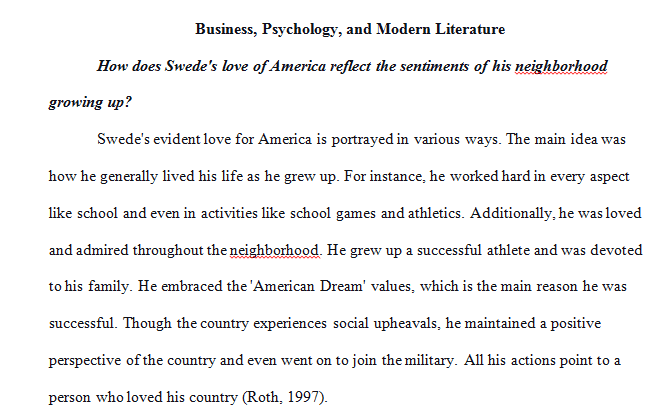Discuss irony in the context of American Pastoral
Business, Psychology, and Modern Literature
A. In this Forum, please answer the following question, which has three parts. Your answer to the following question should be between 300-350 words.
Throughout the book, one of the things given a great deal of detail is the author’s portrayal of America.
Part 1) How does Swede’s love of America reflect the sentiments of his neighborhood growing up?
Part 2) What do Merry’s political beliefs as a young woman say about her feelings towards America?
Part 3) Does the author paint a favorable picture of America?
B. In this Forum, please answer the following question. Your answer to the following question should be between 300-350 words.
Some have argued that the story of Swede offers a unique and heartbreaking look into the life of an “apparent” American hero. Discuss irony in the context of American Pastoral. Is the outcome of Swede’s life ironic?
C. In this assignment, you are going to consider a time when you overreacted. The goal here is to learn ways to respond more skillfully, sensitively, and proportionately to events and people in our lives.
Instructions
1) Think of a recent time you over-reacted to a situation. Don’t include some major life event. Rather, think of some “dust-up,” or some irking episode, which, upon reflection, is not that big a deal in the long run. Write down a very brief description of what transpired, and be sure to include the feelings you felt.
2) Now, take a look at the attached file. It describes a series of steps that some therapists use to help clients re-structure affect is that is disproportionate to a given event. Read over the whole document, and consider especially which of the irrational beliefs may pertain to you.
3) Next, create a catastrophe scale. It’s easy. Draw a line, and mark 0, 25, 50, 75, and 100 on the line. Then, underneath the line, provide an example of an event that would consitute each score (a 25, a 50, a 75, and a 100). Now, events scoring a 100 are the worst events you can imagine. Events closer to 0 are events of little consequence (so little in fact, if you had not had an assignment like this, you may quickly forget they even happen). These are not events that actually have happened (they could be, but they don’t have to be). Just consider, on your subjective scale of life’s possible events, what would constitute for you a 25, a 50, a 75, and a 100 (or something approximating each of those numbers– you can describe what a “15” is if you prefer, rather than a 25, for example. The idea here is to flesh out the relationship between types of events that could conceivably bring you stress. The handout attached here walks you through a version of this.
4) Now the fun part: think back to that event in step 1. On a scale of 1-100, with 100 being the worst thing ever, and with 1 being something so minor you may not have even noticed it, what score would you assign to that event IN THE MOMENT in which it occurred (so NOT what you would assign it now, in the cool light of rationality and distance, but rather what did it feel like in that moment in terms of a score)? Then, situate it where it truly should belong on the scale (e.g., it felt like a 73, but afterwards, like right now, it probably would only constitute a 10 on your scale). The objective is to see how events present in terms of feeling, and to see how they feel much later, with the idea being that it would sometimes really benefit us if we could “cognitively restructure” a disproportionate feeling in the moment to something much more warranting of its true score on our scale.
5) Some theorists argue that we often have an irrational belief somewhere in our internal schema, and that such beliefs are largely responsible for the disproportionate reaction. If we know what our “button” is, sometimes we can have more control over it (or our triggers) in moments of stress. Write a paragraph summarizing your irrational belief (the idea here is that we all have one, and that indeed it’s typically the same irrational belief that triggers us again and again), and how it affected you in this instance, and what you might have told yourself instead, as a result of this exercise. Can you recall other times in your life when this irrational belief has reared its head? How did it affect you, a
Solution preview for the order on discuss irony in the context of American Pastoral
APA
1162 words
